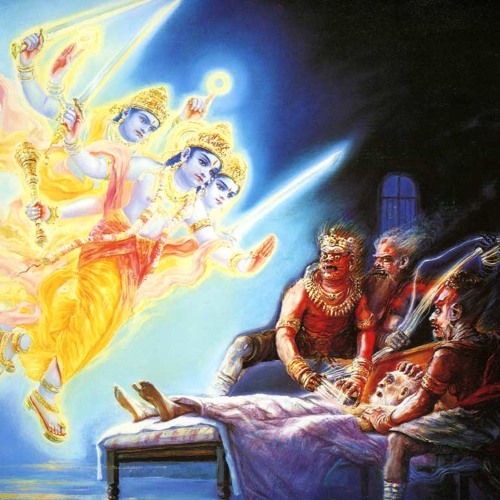Question: In the Bhagavad-Gita, last verse of the second chapter, Krishna says that “… If one is thus situated even at the hour of death, one can enter into the kingdom of God”. Also the purpose of all the practice that we do is to remember Krishna at the time of our final exam – The DEATH. Regarding Ajamila’s deliverance, is his previous karma also involved in this or is it just purely because he chanted Krishna’s name? In case of Ajamila, he didn’t even cry out for Krishna; rather he was calling for his son. So how did he get the mercy of Lord, and what happened to all his karma for all of his bad activities? Does it mean that any person who doesn’t have even a slight spiritual knowledge or bhakti calls his friend or relative whose name is related to Krishna will get the same benediction like Ajamila, and get liberated? We understand that the Name of Krishna is non-different from Krishna Himself, but how do we understand this incident? It is not really clear and looks contradictory to laws of karma.
At least in case of Valmiki when he was a hunter he regretted for all the sins he did and took shelter of his Guru and chanted Krishna’s name sincerely, but again it is not sure what happened to Valmiki after his death, whether he went back to Godhead or was given a better life!! Could you kindly clear this question: what does it mean to remember Krishna at the time of death; does it really have to be with love or can it be out of fear or can it be just calling out someone whose name is Krishna-related?
Answer by Romapada Swami: There are three stages of chanting, namely the offensive stage, the clearing stage and the pure stage. Scriptures list different offenses against chanting the holy names, specifically ten in number. (See Nectar of Devotion, Chapter 8, pg. 72.) The Holy Name is compared to the sun, but offenses shroud the sunshine like clouds. The clearing stage of chanting is called Namabhasa, meaning a shadow or a dim reflection of the holy name. It is compared to the light at daybreak before the sun actually appears on the horizon and yet at once dissipates the darkness of night. In the pure stage of chanting, one’s love of God awakens and Krishna actually manifests to the chanter. Namabhasa, the ‘clearing stage of chanting’, is so powerful that it can burn up the reactions to more sins than one is able to commit! Note that while namabhasa can easily destroy sins and bestow liberation, it cannot give love of God, which is attained only in the pure stage of chanting. Ajamila’s unintentionally calling out the names of Narayana is considered to be in the Namabhasa stage, for it is free of the ten kinds of offenses to the holy name. In other words, Ajamila was not sinning on the strength of his chanting, nor did he consider his chanting to be some material ritualistic activity, etc. Scriptures state that one who chants either unintentionally as when calling a relative, or derisively as did Sisupala, or even unknowingly, as when saying “Bowl-o-Rama” one utters the name “Rama” – they get the benefit of Namabhasa! This is not contradictory to the law of Karma, because Krishna is the Supremely independent Lord, who is the master of the laws of Karma, also provides measures for those who violate the laws of nature to be relieved of the karmic reactions. Chanting of His holy names and the rendering of other forms of devotional services are those very means. This is an exhibition of Krishna’s unlimited mercy to the most fallen conditioned souls who would never willingly serve Him otherwise. Krishna and His names are Absolute and fully pure and thus are fully capable of destroying all impurities even by a slight contact. This implies that the effect of mountains of sins can be easily overcome by chanting as long as one carefully guards against the ten offenses. Ample scriptural evidence to support the above statements can be found in the section of the Ajamila story wherein the Visnuduttas are addressing the Yamaduttas (Chapter 2, Canto 6). You have asked if Ajamila’s great fortune was due to his previous karma. No, devotional service is never created by good karma nor prevented by bad karma; devotional service is obtained only by the Lord’s mercy. By virtue of his practice of brahminical principles in his youth before he had become corrupted, he was somehow inspired to name his youngest son as Narayana. Entirely due to his material attachment, Ajamila constantly chanted his son’s name. However, some Vaishnava acharyas have explained that by his intensely calling out the name of Narayana at his deathbed, he was freed from all sinful reactions and thus he actually began to remember Lord Narayana, the Lord whom he had learned to worship in his childhood.
In either case, anyone who remembers Krishna at the time of death in any frame of mind, whether in love, fear or even hatred is delivered from all sinful reactions. They may be given a second chance, as was the case of Ajamila himself, to perfect their life in devotion. However, it is not certain that one will accidentally remember and offenselessly chant the Lord’s names at the crucial time of death. Those who are wise do not take such chances and therefore diligently practice during their lifetime to take shelter of the holy name. For the sincere devotee, Krishna assures that He will personally appear in their minds at the time of death, even if they happen to forget Him by chance.







